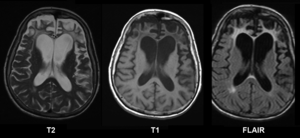Pick disease
| Pick's disease | |
|---|---|
 |
|
| Brain MRI in Pick's disease | |
| Classification and external resources | |
| Specialty | Neurology, Psychiatry |
| ICD-10 | G31.0, F02.0 |
| ICD-9-CM | 331.11 |
| OMIM | 172700 |
| DiseasesDB | 10034 |
| MedlinePlus | 000744 |
| eMedicine | neuro/311 |
| MeSH | D020774 |
Pick's disease is a term that can be used in two different ways. It has traditionally been used as a term for a group of neurodegenerative diseases with symptoms attributable to frontal and temporal lobe dysfunction. Common symptoms that are noticed early are personality and emotional changes, as well as deterioration of language. This condition is now more commonly called frontotemporal dementia by professionals, and the use of Pick's disease as a clinical diagnosis has fallen out of fashion. The second use of the term (and the one now used among professionals) is to mean a specific pathology that is one of the causes of frontotemporal lobar degeneration. These two uses have previously led to confusion among professionals and patients and so its use should be restricted to the specific pathological subtype described below. It is also known as Pick disease and PiD (not to be confused with pelvic inflammatory disease (PID) or Parkinson's disease (PD)). A defining characteristic of the disease is build-up of tau proteins in neurons, accumulating into silver-staining, spherical aggregations known as "Pick bodies".
The symptoms of Pick's disease include difficulty in language and thinking, efforts to dissociate from family, behavioral changes, unwarranted anxiety, irrational fears, CBD (Compulsive buying disorder, or oniomania), impaired regulation of social conduct (e.g., breaches of etiquette, vulgar language, tactlessness, , misperception), passivity, low motivation (aboulia), inertia, over-activity, pacing and wandering. It is a characteristic of Pick’s disease that dysfunctional, argumentative, or hostile social conduct is initially exhibited towards family members and not initially exhibited in a workplace or neutral environment. The changes in personality allow doctors to distinguish between Pick's disease and Alzheimer's disease. Pick's disease is one of the causes of the clinical syndrome of frontotemporal lobar degeneration which has three subtypes. Pick's disease pathology is associated more with the frontotemporal dementia and progressive nonfluent aphasia subtypes than the semantic dementia subtype.
...
Wikipedia
